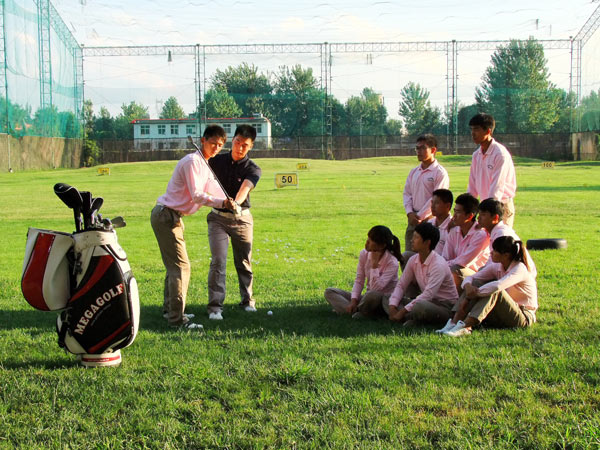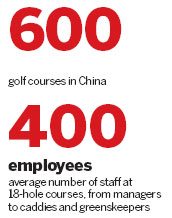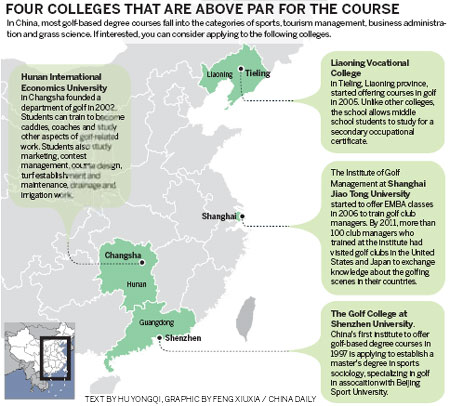Golf students prepare to join the club
By Hu Yongqi and Pei Pei (China Daily) Updated: 2012-09-11 07:54The growing popularity of golf in China has seen an increase in the number of students opting to study the sport at degree level in colleges. Report by Hu Yongqi and Pei Pei in Shijiazhuang.
 |
|
Students under instruction at the Hebei Institute of Physical Education in Shijiazhuang, capital of Hebei province. The institute is one of a small number of schools providing golf degrees in China. Photos by Liu Xiang / China Daily |
While some of his high school classmates are still experiencing difficulty finding a job, Feng Jian has been just been promoted. He now manages 100 caddies at a golf club in Beijing, just 12 months after graduation, thanks to his four-year study of the sport.
Two months before the national college entrance exam in 2007, Feng realized that his academic performance was unlikely to gain him entry to a high-ranking university. So the young man reasoned that his athletic abilities might give him a better chance at a sports college, where less emphasis is placed on academic ability.
The native of Xianghe county in Hebei province set about applying to become a golf major, a study that friends said was likely to offer a green light for future employment. He was accepted to study at Hebei Institute of Physical Education in Shijiazhuang, the provincial capital.
"I had no idea of the potential market for golf, but I fell in love with the sport almost as soon as I started learning," said Feng. "Later, two years of internship at various clubs convinced me that golf would be my career."
Last year, Feng was hired by Beijing Sigesen Golf Club, earning 5,000 yuan ($790) a month, plus free accommodation and other daily necessities.

He said he's content, especially as many classmates who chose other majors are much worse off than him. "I have to say my choice was right and my training has provided a lot more opportunities than other sports majors," said the 26-year-old.
Currently, about 100 universities and sports colleges offer courses in coaching, course maintenance and club management. The Hebei Institute has the largest number of students, 1,370, and since 2007, 470 of its graduates have moved on to work in the industry. Meanwhile, the golf college at Shenzhen University has produced more than 300 golf professionals since 1995.
As the sport becomes more acceptable and accessible in China, a growing demand for professionals has ensured that almost all golf graduates can opt to work at a club after university.
Although there are no official statistics on the value of the industry in China, a 2010 report published by the Huidian market research website calculated that the market was worth more than 60 billion yuan in 2009, an increase on the 47.9 billion yuan registered in 2006.
China's cradle of golf
The Hebei Institute was China's pioneer in golf studies. In 1985, the Hebei Committee of Sports - now Hebei Provincial Bureau of Sports - sponsored 11 promising players to study in Japan for three years, with the aim of producing seasoned instructors and players. Cui Zhiqiang, who led the trainee group, began teaching golf on his return to China in 1989.
 |
|
Students at the Hebei Institute undertake a variety of regular physical exercises. |
Meanwhile, Cui's fellow trainees also started their careers as professional players or coaches, and one of them, Cheng Jun, won the Chinese Amateur Championship in 1990.
However, Shijiazhuang had no golf clubs at the end of the 1990s, and most of the trainees moved to Guangdong province to work at clubs there. Once they'd gained enough experience and money, a number of them started running their own clubs.
Meanwhile, Cheng and his classmates maintained close contact with the Hebei Institute and expressed their ambition to establish a degree course. In 2003, the school obtained approval to create a major in sports, specializing in golf. The first year saw an intake of 24 students.
In 2008, the school enrolled 118 students for a bachelor's degree. That number doubled in 2010 and this year there are 370 freshmen golf majors, accounting for almost 28 percent of the newcomers to the institute's seven sports majors.
As the Chinese idiom says, the first step is the hardest. In the first four years, the school had to invite coaches from golf clubs and a number of graduates, such as Cheng Jun, to give lectures. A lack of textbooks was another major obstacle, and the department had to arrange for non-specialist teachers to study foreign golf books and then teach the subject.
The department also had to rent practice facilities at a club in Shijiazhuang at a cost of at least 500 yuan per hour per person. To provide students with more opportunity to practice, the school invested 1.8 million yuan to build a driving range with 54 practice bays. Students currently have eight hours of formal practice per week, but the range is open every day so they can practice in their leisure time too.
In 2008, the first group of golf graduates stayed on at the Hebei Institute as teachers, helping to develop the major through their own experience.
Each golf student pays annual tuition fees of 12,000 yuan, almost twice as much as other majors. Still, many students apply for the study because of the employment prospects. Every year, about 50 to 60 students from other sporting disciplines transfer to study golf.
All graduates from the Hebei Institute have found good jobs, and that has encouraged more to apply for the study. A sharp increase in the number of freshmen in 2008 saw the school attach greater importance to the booming major.
The school's president Zhang Zhuo'an endorsed a plan to spend 6 million yuan to construct a new driving range, with 400 practice bays spread over 20 hectares.
Li Yuesheng, director of the social sports department at the Hebei Institute, is always eager to show visitors around the facility. "I am proud to say that our school will soon have the largest driving range in Asia. For me, that's the future," he said.
As the facilities were updated, the students' skills improved and in 2010 the school won two silver medals at the All-China Games.

Elite, expensive
Since its introduction to China 28 years ago, golf has been regarded as an elite, expensive sport. At the Sigesen club, non-members pay 1,080 yuan per person per round and caddies expect a tip of at least 100 yuan. Even with a permanent membership, which costs 188,000 yuan per person, the price of a round is still 260 yuan.
The fees are likely to remain high since the central government restricted construction of new golf courses because of concerns about land and water resources.
So far, China has produced few really excellent professional golfers. Liang Wenchong and Feng Shanshan are probably the only homegrown players capable of competing with foreign players. In June, Feng, 22, became the first Chinese golfer to win the LPGA Championship in the US.
However, the golfing authorities are attempting to boost the sport following the decision of the International Olympic Committee in 2010 to reintroduce golf at the 2016 Games in Rio de Janeiro, said Zhang Zhuo'an.
In 2010, about 3 million people in China played golf, but that number could soar to 50 million by 2020, according to the Huidian report.
"It's a good chance for golf in China, and the industry will require an enormous number of pros to manage clubs," said Li Yuesheng.
At present, there are only 600 golf courses nationwide, but the number of new courses is rising by 20 to 30 percent annually, according to the Hebei Institute's data.
Each 18-hole course has at least 400 employees, from managers to caddies and greenskeepers, said Li, and his calculations suggest that industry requires at least 240,000 workers. However, more than 60 percent of current workers studied at middle or high schools and lack the necessary knowledge of the sport, so many clubs are planning to replace their current staff with golf graduates.
The tough nature of the work means that some clubs in Shanghai have an annual employee turnover of 70 percent, while the lowest staff turnover rate was still more than 10 percent, said Wu Ming, director of the Institute of Golf Management at Shanghai Jiao Tong University.
Working with clubs
In their first two years at the Hebei Institute, students learn golfing theory, etiquette and the rules of the game. To gain practical experience at running a club, they are assigned two-year internships at clubs nationwide, including the Sigesen club in Beijing.
In 2009, Zhang Zhigang, Beijing Sigesen's deputy general manager, was impressed with the performance of two interns of the Hebei Institute, so he contacted the school and promised to employ more of its graduates.
"The golf industry is fundamentally about service. Many jobs such as turf maintenance and caddying are hard work, and require not only a knowledge of the game, but also a good service attitude," said Zhang.
Feng Jian said he learned about many aspects of the industry during his internship, especially how to deal correctly with high-end customers. "I knew how to do the job of a caddie or receptionist because the clubs told us about all the processes and problems we had to avoid. The experience gave me an advantage when I graduated and began looking for a job."
In the past two years, Zhang Zhigang's club has recruited more than 40 students from the institute, accounting for 15 percent of its total workforce. Each year, the club focuses on developing five key employees who have shown potential and are interested in running the course. Feng Jian is one of the workers listed.
Other sports colleges are following this template. Shenyang Sport University in Liaoning province enrolled its first group of 30 students last year and plans to have them intern at nearby clubs.
"The benefit of working with the clubs is also reflected in teaching resources. All the schools should employ more golf professors, but the clubs now have a lot more professionals that we can invite to teach our students," said Cao Jihong, dean of the social sports college at the university.
"Clubs and colleges have their own comparative advantages, so the only way to produce high-quality golf professionals is to work with the schools. We give a helping hand to colleges in building up golf majors, and we can send our workers for further education when those majors mature," said Zhang. "When that happens the industry will be upgraded with more professionally trained talent."
Liu Ce in Shenyang contributed to this report.
Contact the reporters at huyongqi@chinadaily.com.cn and peipei@chinadaily.com.cn
- Curb golf course construction
- The rise of Asia's 'Tiger women'
- The great golf hope
- Was June the start of a new era for Chinese golf?
- The China Golf Beauty Celebrity Invitation Contest kicks off
- Even Yao isn't all that good at golf
- Golf victory may give sport new drive
- Golf-Teenager Zhang relishes Tiger time at US Open
- Watchdog pledges to intensify scrutiny
- Court says community road rule needs legislative support
- Improved child care leave for both parents introduced in Shanghai
- Beijing set to double air monitoring stations
- Train ticket glitch results in a lawsuit
- Many workers looking to change jobs in new year
- China looks to regulate city growth
- Beijing to raise threshold for issuing air pollution 'red alerts'
- Green cards decision to bear fruit for foreigners
- Fake story online sparks concern over credibility of cyberspace







